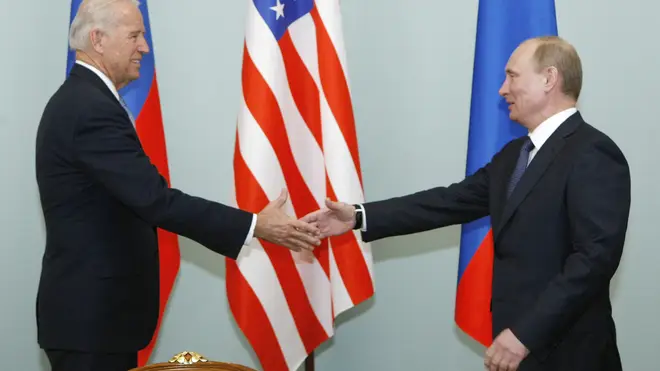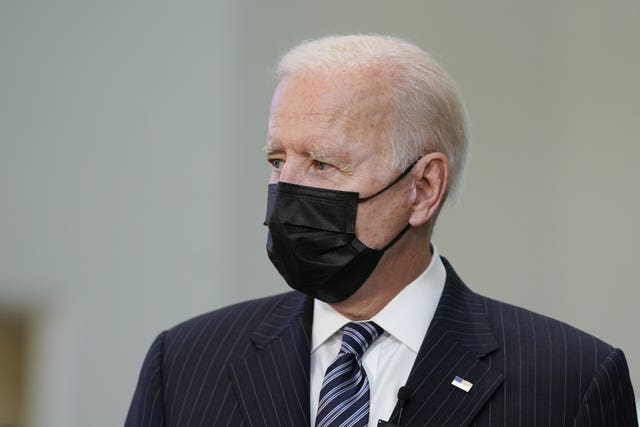
Nick Ferrari 7am - 10am
25 May 2021, 15:44

The face-to-face meeting next month has been set amid escalating tensions between the US and Russia.
Joe Biden will hold a summit with Vladimir Putin next month in Geneva, a face-to-face meeting between the two leaders that comes amid escalating tensions between the US and Russia in the first months of the Biden administration.
The White House confirmed details of the summit on Tuesday.
The two leaders’ scheduled meeting, set for June 16, is being tacked on to the end of Mr Biden’s first international trip as president next month when he visits Britain for a meeting of Group of Seven leaders and Brussels for the Nato summit.
Mr Biden first proposed a summit in a call with Mr Putin in April as his administration prepared to levy sanctions against Russian officials for the second time during the first three months of his presidency.
White House officials said earlier this week that they were ironing out details for the summit. National security adviser Jake Sullivan discussed details of the meeting when he met with his Russian counterpart, Nikolay Patrushev.
The White House has repeatedly said it is seeking a “stable and predictable” relationship with the Russians, while also calling out Putin on allegations that the Russians interfered in last year’s US presidential election and that the Kremlin was behind a hacking campaign — commonly referred to as the SolarWinds breach — in which Russian hackers infected widely used software with malicious code, enabling them to access the networks of at least nine US agencies.

The Biden administration has also criticised Russia for the arrest and jailing of opposition leader Alexei Navalny and publicly acknowledged that it has low to moderate confidence that Russian agents were offering bounties to the Taliban to attack US troops in Afghanistan.
The Biden administration announced sanctions in March against several mid-level and senior Russian officials, along with more than a dozen businesses and other entities, over a nearly fatal nerve-agent attack on Mr Navalny in August 2020 and his subsequent jailing.
Mr Navlany returned to Russia days before Mr Biden’s January 20 inauguration and was quickly arrested.
Last month, the administration announced it was expelling 10 Russian diplomats and sanctioning dozens of Russian companies and individuals in response to the SolarWinds hack and election interference allegations.
But even as Mr Biden moved forward with the latest round of sanctions, he acknowledged that he held back on taking tougher action — an attempt to send the message to Mr Putin that he still held hope that the US and Russia could come to an understanding for the rules of the game in their adversarial relationship.
In fact, he brought up the idea of holding a third-country summit in an April 13 call in which he notified Mr Putin that a second round of sanctions was coming.
During his campaign for the White House, Biden described Russia as the “biggest threat” to U.S. security and alliances, and he disparaged his predecessor President Donald Trump for his cozy relationship with Putin. Trump avoided direct confrontation with Putin and often sought to downplay the Russian leader’s malign actions.
Weeks into his presidency, Mr Biden said in an address before State Department employees that he told Mr Putin in their first call that he would be taking a radically different approach to Russia than Donald Trump.
“I made it clear to President Putin, in a manner very different from my predecessor, that the days of the United States rolling over in the face of Russia’s aggressive actions — interfering with our election, cyber attacks, poisoning its citizens — are over,” said Mr Biden, who last week spoke to Mr Putin in what White House officials called a tense first exchange.
“We will not hesitate to raise the cost on Russia and defend our vital interests and our people.”
In March, Mr Biden in an ABC News interview responded affirmatively when asked by interviewer George Stephanopoulos whether he thought Putin was “a killer.”
Kremlin spokesman Dmitry Peskov said that Mr Biden’s comment demonstrated he “definitely does not want to improve relations” with Russia and that relations between the countries were “very bad”.